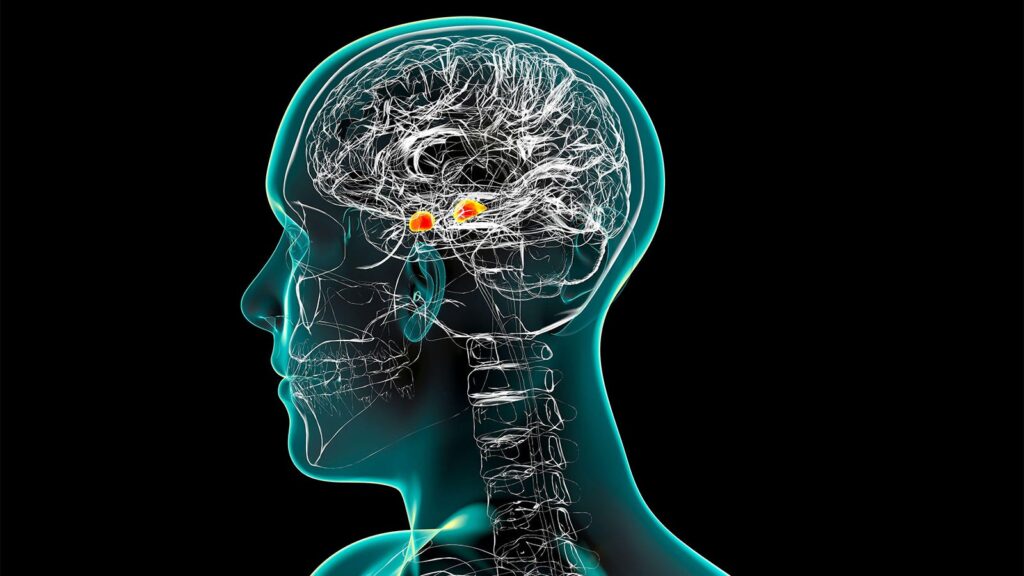An investigational therapy for post-traumatic stress disorder (PTSD) improved symptom severity as soon as one month into a 12-week, phase IIb study.
In a modified intent-to-treat analysis of 182 patients, treatment effects with BNC210 — a novel α7 nicotinic acetylcholine receptor-negative allosteric modulator — were seen as early as week 4 versus placebo, with a least squares mean difference -4.11, based on the Clinician-Administered PTSD Scale for DSM-5 (CAP-5), according to Spyridon Papapetropoulos, MD, PhD, of Bionomics in Burlington, Mass., and colleagues.
Overall, the agent improved symptom severity scores at week 12 versus placebo (LSMD -4.03, Cohen’s d effect size 0.40, P=0.048), they reported in NEJM Evidence. The findings were simultaneously presented at the American College of Neuropsychopharmacology annual meeting in Phoenix.
But the short treatment period was a study limitation, the authors acknowledged, as was the early trial discontinuation that occurred in 46.2% of the patients on BNC210 versus 37.7% of placebo patients, primarily because of adverse events (AEs). The latter may have introduced bias, despite efforts to correct for missing data, according to Papapetropoulos and colleagues.
They also said that “[i]t will be of interest to see if the 4-week onset of improvement can be replicated in further trials,” but emphasized that the “trial achieved its primary and several secondary end points, highlighting the potential of BNC210 to improve key symptoms experienced by patients with PTSD.”
Papapetropoulos’ group explained that the “[t]reatment options for PTSD are limited, and no new pharmacological treatments have been approved in over 20 years.” Sertraline and paroxetine are the current FDA approved treatments for PTSD, but these selective serotonin reuptake inhibitors (SSRIs) “offer “modest efficacy” and include adverse effects, such as “delayed onset of therapeutic effect, potential for induction of anxiety on treatment initiation, discontinuation syndrome when stopped abruptly, and sexual dysfunction,” they said.
The authors pointed out that
The ATTUNE trial was done at 28 sites in the U.S. and seven in the U.K. between July 2021 and April 2023. In the total safety population, the mean age was 42.3. The majority of participants were white females. The mean time since the trauma event was 101.9 months and the most common index trauma events were physical assault (20.1%) and sexual assault (17.7%). The mean CAPS-5 total score was 41.5.
Patients were randomly assigned 1:1 to receive either a 900-mg dose of BNC210 twice daily or a placebo. They were asked to return to the trial site every 4 weeks to complete efficacy assessments and receive trial medication. They were also asked to return every 2 weeks to complete safety assessments. The final follow-up visit occurred at week 15.
The authors found that patients with PTSD saw reduced depressive symptoms based on the Montgomery-Åsberg Depression Rating Scale (LSMD -3.19) and for sleep disorder symptoms based on the Insomnia Severity Index (LSMD -2.19) versus patients on placebo.
As for AEs, at least one treatment-emergent AE occurred in 66.7% in the BNC210 group and 53.8% in the placebo group. The most common AEs (>5% in each group) were nausea, fatigue, hepatic enzyme elevations, and headache, with more BNC210 patients experiencing the last two AEs versus placebo patients. The authors noted that “the elevations in hepatic enzymes were not associated with liver injury or decompensation, nor were there any elevations in bilirubin levels.” There were no serious AEs or deaths in either group.
The discontinuation rate due to AEs and loss to follow up was higher in the BNC210 group versus placebo (19.8% vs 12.3%). Two patients on BNC210 reported AEs of moderate suicidal ideation, so the drug was withdrawn, and the suicidal ideation resolved, according to Papapetropoulos’ group.
Another trial limitation was a lack of generalizability because of the exclusion of patients with more complex disorders; childhood trauma; those who were already receiving trauma-focused psychotherapy; and those with more complex comorbidity.
But the authors stated that in general, “the trial population represented the broader PTSD population” and that the current data could establish a foundation to begin larger trials to determine whether the novel treatment has the clinical utility to treat PTSD, they noted.
BNC210 developer Bionomics announced in July 2024 that the FDA had given the agent a fast track designation as a potential treatment for PTSD and social anxiety disorder. A planned phase III trial will evaluate two dose levels of BNC210 in a 12-week randomized, double-blind, placebo-controlled trial with a 52-week open-label extension, according to a press release.
Disclosures
The trial was funded by Bionomics. Some co-authors are company employees.
Primary Source
NEJM Evidence
Source Reference: Papapetropoulos S, et al “BNC210, an α7 nicotinic receptor modulator, in post-traumatic stress disorder” NEJM Evid 2024; DOI: 10.1056/EVIDoa2400380.
Please enable JavaScript to view the comments powered by Disqus.
Source link : https://www.medpagetoday.com/psychiatry/anxietystress/113274
Author :
Publish date : 2024-12-08 22:00:00
Copyright for syndicated content belongs to the linked Source.
